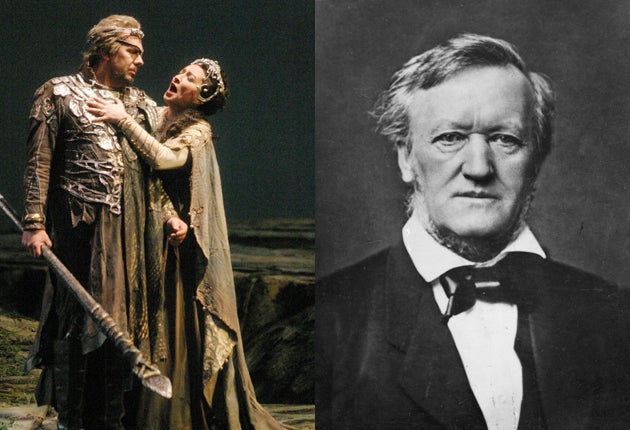Fry: 'My love of Wagner is tearing me apart'
Stephen Fry is to discuss his complex feelings towards the composer on BBC4, writes Ian Burrell

Your support helps us to tell the story
From reproductive rights to climate change to Big Tech, The Independent is on the ground when the story is developing. Whether it's investigating the financials of Elon Musk's pro-Trump PAC or producing our latest documentary, 'The A Word', which shines a light on the American women fighting for reproductive rights, we know how important it is to parse out the facts from the messaging.
At such a critical moment in US history, we need reporters on the ground. Your donation allows us to keep sending journalists to speak to both sides of the story.
The Independent is trusted by Americans across the entire political spectrum. And unlike many other quality news outlets, we choose not to lock Americans out of our reporting and analysis with paywalls. We believe quality journalism should be available to everyone, paid for by those who can afford it.
Your support makes all the difference.Stephen Fry, the grandson of Jewish immigrants, has made a documentary for the BBC on his life-long passion for Wagner, the composer whose music is most closely associated with Nazism.
During the making of the film Fry visited the site of the Nazi Nuremburg rallies, at which a performance of Wagner's opera, Die Meistersinger von Nürnberg, was the traditional opening for the annual event. "I've always loved music. I've always been hopeless at performing it, couldn't really play an instrument, and certainly can't sing, but it has made me do things inside, it has released forces within me – and no music has done it like Wagner's," said Fry, who grew up in Norfolk and was introduced to the composer's music by his father when he was 10 years old. The actor and comedian had relatives who died at Auschwitz, something he discusses in the BBC Four programme Stephen Fry on Wagner.
Richard Wagner died in 1883 but his music was appropriated by the Nazis and used an introduction to speeches by Hitler, who regarded him as "the Master". In spite of Fry's love for the composer's work, he acknowledges that the music has been tarnished by its association with Nazism. "Imagine a great beautiful silk tapestry of infinite colour and complexity that has been stained indelibly. It's still a beautiful tapestry of miraculous workmanship, but that stain is real, and I'm afraid Hitler and Nazism have stained Wagner. For some people that stain ruins the whole work; for others, it's just something you have to face up to."
The documentary forms part of the spring-summer season on BBC Four, which also includes Opera Italia, a programme in which Antonio Pappano, the ebullient music director of the Royal Opera, traces the role that the art form has played in Italian cultural life.
The season also includes a biopic of John Lennon that has Christopher Eccleston in the starring role and charts the life of the Beatle during the years 1967 to 1971 when he left Britain for America and met Yoko Ono.
In another drama project for the BBC Four season, the corporation finds itself in the unusual situation of making a programme about ITV's most successful show, Coronation Street. The drama is named Florizel Street in memory of the soap's original title (dropped because some of the cast found it difficult to pronounce). It tells the story of writer Tony Warren's battle to bring to the screen the stories based on characters that he knew in his youth. The drama is part of a series of programmes under the banner the Great Northern Season, exploring the influence of the north of England on British culture in the post-war years.
The channel also makes a rare foray into the sci-fi genre with Mark Gatissappearing as an Edwardian professor in an adaptation of H G Wells's 1901 novel The First Men in the Moon.
Join our commenting forum
Join thought-provoking conversations, follow other Independent readers and see their replies
Comments